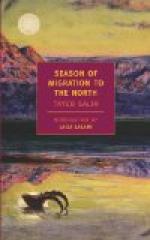Before passing the cup on to the rest of the company that they may drink, the old man or woman states aloud the date and place of his or her birth, as accurately as it can be remembered. The drinking and thinking ceremony is performed by all in succession, down to the last naked baby cuddling in its mother’s artikki, the little child that cannot yet speak. The solemn rite is brought to a close by the tossing of presents across the ring from one to the other, the theory being that, as they generously deal with others, so Sidne will deal with them in the coming year. So up here on the edge of things, among our “uncivilised heathens,” we have our Christmas presents and “Peace on earth, good will to men.”
CHAPTER XV
MAINLY CONCERNING FOOD
“Man does not live by bread alone.”
Exigencies of life have caused the Mackenzie Eskimo to formulate on vital matters an unwritten law to which each gives assent. Succinctly stated, this system of Northland jurisprudence runs thus:—
(a) Should a man, inadvertently or by malice aforethought, kill another, the wife and children of the man so killed remain a burden on the murderer so long as he or they live.
(b) A drift-log found is treasure-trove, and belongs to the finder, who indicates possession by placing upon it a pipe, mitten, or personal trinket of some kind. Whalers, missionaries and Mounted Police are a unit in testifying that precious flotsam of this kind has remained four or five years in a land of wood-scarcity without being disturbed.
(c) No one must eat seal and walrus on the same day. Thus a check is given to luxuriousness and the Eskimo is self-prevented from falling into the fate which overtook Rome.
(d) All large animals killed are to be looked upon as common property of the tribe and not as a personal belonging of the man who kills them. Thus here, under the Northern Lights, do the Farthest North subjects of the Seventh Edward work out in deeds the dream of Sir Thomas More’s crescent-isle of Utopia where men lived and worked as brothers, holding all things in common.
The Eskimo realises that the pleasure of life is in pursuit, not in acquisition. Where wants are many, joys are few; the very austerity of his life has made a man of him. Laying up few treasures for the elements to corrupt, accumulating no property except a little, a very little, of the kind designated by Wemmick as “portable,” he, to better and saner effect than any man, decreases the denominator of his wants instead of increasing the numerator of his havings. Surrounded by the palcocrystic ice, the genial current of his soul has not been frozen by that ice. An Eskimo family accepts life with a smile and, in the faith of little children, goes on its way.




